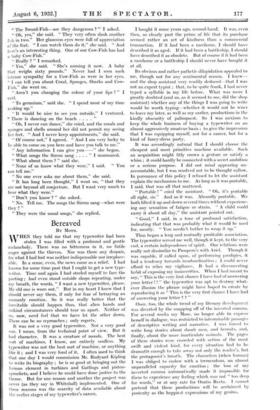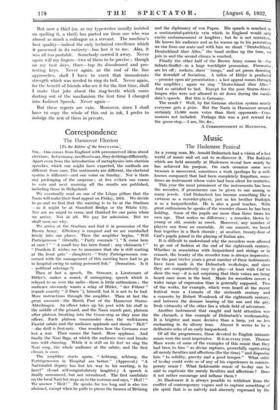Bereaved
BY MOTH.
WH been they told me that my typewriter had bn W stolen I was filled with a profound and gentle melancholy. There was no bitterness in it, no futile anger against the thieves. Nor was there any despair, for what I had lost was neither indispensable nor irreplace- able. In a sense, even, the news came as a relief. I had known for some time past that I ought to get a new type- writer. Time and again I had steeled myself to face the parting ; had even stood outside shops repeating, under my breath, the words, "I want a new typewriter, please. 1■Iy old one is worn out." But in my heart I knew that I should never say them, if only for fear of betraying an unmanly emotion. So it was really better that the inevitable should happen thus, that alien hands and unkind circumstances should tear us apart. Neither of us, now, need feel that we have let the other down. There can be no reproaches ; only regrets.
It was not a very good typewriter. Not a very good one, I mean, from the technical point of view. But it had character. It was a creature of moods. The best sort of machines, I know; are entirely soulless. My typewriter was not the best sort of machine, or anything like it ; and I was very fond of it. I often used to think that one day I would commission Mr. Rudyard Kipling to write its biography ; he is so good at bringing out the human element in turbines and Gatlings and piston- sprockets, and I believe he could have done justice to the theme. But for one reason and another the project was never (as they say in Whitehall) implemented. One of these reasons was the scarcity of data available about the earlier stages of my typewriter's career. I bought it some years ago, second-hand. It was, even then, so clearly past the prime of life that its purchase seemed rather an act of kindness than a commercial transaction. If it had been a racehorse, I should have described it as aged. If it had been a battleship, I should have described it as obsolete. But of course if it had been a racehorse or a battleship I should never have bought it at all.
Its'obvious and rather pathetic dilapidation appealed to me, though not for any sentimental reason. I knew— and the shop assistant very readily deduced—that I was not an expert typist ; that, to be quite frank, I had never typed a syllable in my life before. What was more I greatly doubted (and so, as it seemed to me, did the shop assistant) whether any of the things I was going to write would be worth typing—whether it would not be wiser to leave my later, as well as my earlier, productions in the kindly obscurity of palimpsest. So I was anxious to keep the whole business of buying a typewriter on an almost aggressively amateur basis ; to give the impression that I was equipping myself, not for a career, but for a kind of fancy-dress party.
It was accordingly natural that I should choose the cheapest and most primitive machine available. Such an acquisition might fitly crown a gesture or satisfy a whim ; it could hardly be connected with a secret ambition or a serious purpose. I did not mind appearing un- accountable, but I was resolved not to be thought callow. In pursuance of this policy I refused to let the assistant explain the mechanism to me. As long as it was portable, I said, that was all that mattered.
" Portable ! " cried the assistant. " Oh, it's portable all right, sir." And so it was. Absurdly portable. We both lifted it up and down several times without experienc- ing any sensation of fatigue or strain. "A child could carry it about all day," the assistant pointed out.
" Good," I said, in a tone of profound satisfaction, indicating that that was probably what it would he used for, mostly. " You needn't bother to wrap it up."
Thus began a long and mutually profitable association. The typewriter served me well, though it kept, to the very end, a certain independence of spirit. Our relations were really not dissimilar to Prospero's with Arid. Though it was capable, if called upon, of performing prodigies, it had a tendency towards insubordination ; I could never afford to relax my vigilance. It had a disconcerting habit of exposing my insincerities. When I had meant to say, "This is the very first chance I have had of answering your letter ! ! " the typewriter was apt to destroy what- ever illusion the phrase might have hoped to create by reproducing it as" This is the very first chance I have had of answering your letter ? ? "
Once, too, the whole trend of my literary development was diverted by the snapping off of the inverted comma.
For several weeks my Muse, no longer able to express herself in dialogue, was restricted to interminable passages of descriptive writing and narrative. I was forced to write long stories about dumb men, and hermits, and, finally, about the more inarticulate animals. The pages of these stories were crowded with action of the most swift and violent kind, for every situation had to be dramatic enough to take away not only the reader's, but the protagonist's breath. The characters (when human) I was obliged to endow with a tremendous, an almost unparalleled capacity for emotion ; the loss of my inverted comma automatically made it impossible for them to experience any feeling which was not "too deep for words," or at any rate for Oratio Recta. I cannot pretend that these productions will be acclaimed by posterity as the happiest expressions of my genius. But now a thief (or, as my typewriter usually insisted on spelling it, a theif) has parted me from one who was almost as much a colleague as a servant. The machine's best quality—indeed the only technical excellence which it possessed in its entirety—has lost it to me. Alas, it was all too portable. Somebody carried it away. Never again will my fingers—two of them to be precise ; though on my best days, three—tap its discoloured and pro- testing keys. Never again, as the end of the line approaches, shall I have to exert that immoderate strength which was needed to ring its bell. Never again, for the benefit of friends who see it for the first time, shall I make that joke about the stag-beetle which came darting out of the mechanism the first time I changed into Indirect Speech. Never again— But these regrets are vain. Moreover, since I shall have to copy the whole of this out in ink, I prefer to indulge the rest of them in private.



























 Previous page
Previous page